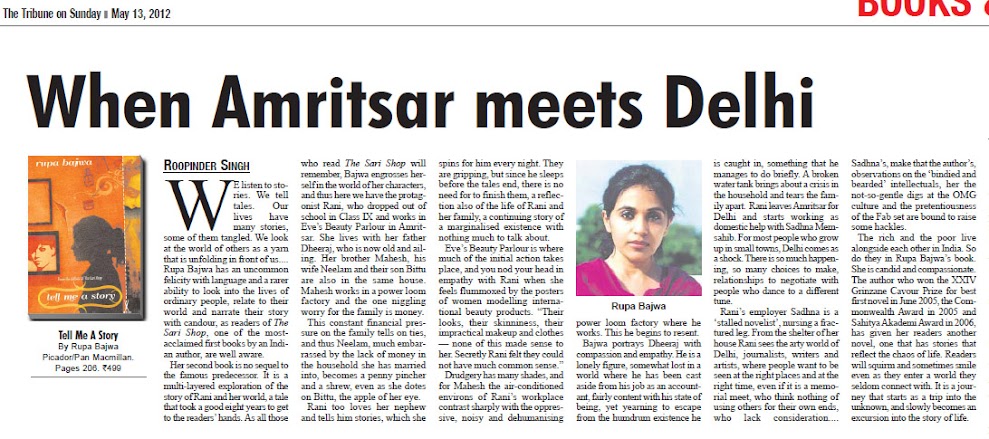Tell Me A Story
By Rupa Bajwa
Picador/Pan Macmillan.
Pages 206. Rs 499.
WE listen to stories. We tell tales. Our lives have many stories, some of them tangled. We look at the world of others as a yarn that is unfolding in front of us…. Rupa Bajwa has an uncommon felicity with language and a rarer ability to look into the lives of ordinary people, relate to their world and narrate their story with candour, as readers of The Sari Shop, one of the most- acclaimed first books by an Indian author, are well aware.
 Her second book is no sequel to the famous predecessor. It is a multi-layered exploration of the story of Rani and her world, a tale that took a good eight years to get to the readers’ hands. As all those who read The Sari Shop will remember, Bajwa engrosses herself in the world of her characters, and thus here we have the protagonist Rani, who dropped out of school in Class IX and works in Eve’s Beauty Parlour in Amritsar. She lives with her father Dheeraj, who is now old and ailing. Her brother Mahesh, his wife Neelam and their son Bittu are also in the same house. Mahesh works in a power loom factory and the one niggling worry for the family is money.
Her second book is no sequel to the famous predecessor. It is a multi-layered exploration of the story of Rani and her world, a tale that took a good eight years to get to the readers’ hands. As all those who read The Sari Shop will remember, Bajwa engrosses herself in the world of her characters, and thus here we have the protagonist Rani, who dropped out of school in Class IX and works in Eve’s Beauty Parlour in Amritsar. She lives with her father Dheeraj, who is now old and ailing. Her brother Mahesh, his wife Neelam and their son Bittu are also in the same house. Mahesh works in a power loom factory and the one niggling worry for the family is money.
This constant financial pressure on the family tells on ties, and thus Neelam, much embarrassed by the lack of money in the household she has married into, becomes a penny pincher and a shrew, even as she dotes on Bittu, the apple of her eye.
Rani too loves her nephew and tells him stories, which she spins for him every night. They are gripping, but since he sleeps before the tales end, there is no need for to finish them, a reflection also of the life of Rani and her family, a continuing story of a marginalised existence with nothing much to talk about.
Eve’s Beauty Parlour is where much of the initial action takes place, and you nod your head in empathy with Rani when she feels flummoxed by the posters of women modelling international beauty products. “Their looks, their skinniness, their impractical makeup and clothes — none of this made sense to her. Secretly Rani felt they could not have much common sense.”
Drudgery has many shades, and for Mahesh the air-conditioned environs of Rani’s workplace contrast sharply with the oppressive, noisy and dehumanising power loom factory where he works. This he begins to resent.
 Bajwa portrays Dheeraj with compassion and empathy. He is a lonely figure, somewhat lost in a world where he has been cast aside from his job as an accountant, fairly content with his state of being, yet yearning to escape from the humdrum existence he is caught in, something that he manages to do briefly. A broken water tank brings about a crisis in the household and tears the family apart. Rani leaves Amritsar for Delhi and starts working as domestic help with Sadhna Memsahib. For most people who grow up in small towns, Delhi comes as a shock. There is so much happening, so many choices to make, relationships to negotiate with people who dance to a different tune.
Bajwa portrays Dheeraj with compassion and empathy. He is a lonely figure, somewhat lost in a world where he has been cast aside from his job as an accountant, fairly content with his state of being, yet yearning to escape from the humdrum existence he is caught in, something that he manages to do briefly. A broken water tank brings about a crisis in the household and tears the family apart. Rani leaves Amritsar for Delhi and starts working as domestic help with Sadhna Memsahib. For most people who grow up in small towns, Delhi comes as a shock. There is so much happening, so many choices to make, relationships to negotiate with people who dance to a different tune.
Rani’s employer Sadhna is a ‘stalled novelist’, nursing a fractured leg. From the shelter of her house Rani sees the arty world of Delhi, journalists, writers and artists, where people want to be seen at the right places and at the right time, even if it is a memorial meet, who think nothing of using others for their own ends, who lack consideration…. Sadhna’s, make that the author’s, observations on the ‘bindied and bearded’ intellectuals, her the not-so-gentle digs at the OMG culture and the pretentiousness of the Fab set are bound to raise some hackles.
The rich and the poor live alongside each other in India. So do they in Rupa Bajwa’s book. She is candid and compassionate. The author who won the XXIV Grinzane Cavour Prize for best first novel in June 2005, the Commonwealth Award in 2005 and Sahitya Akademi Award in 2006, has given her readers another novel, one that has stories that reflect the chaos of life. Readers will squirm and sometimes smile even as they enter a world they seldom connect with. It is a journey that starts as a trip into the unknown, and slowly becomes an excursion into the story of life.
This review by Roopinder Singh was published in the Spectrum section of The Tribune on May 13, 2012.
You may also like to read an interview with Rupa Bajwa that was published after she won the the Sahitya Akademi Award in 2009.




